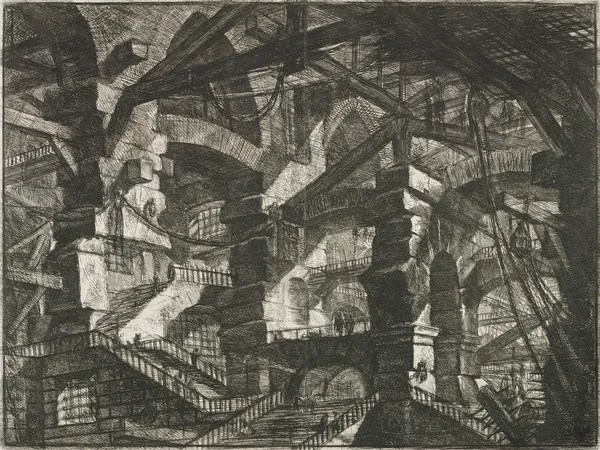Piranesi: The Birth of a New Prison
![]()
Michel Foucault describes in his Discipline and Punish: The Birth of the Prison a vision of surveillance society on the model of Jeremy Bentham’s Panopticon, a prison designed with a guard-tower in the middle of a cylinder of cells facing the tower. The guard can essentially see all cells at all times, but the prisoners cannot know whether the guard is watching them or any other prisoner at any given time. Thereby, if the prisoner could be surveilled at any time – they are functionally being surveilled at all times. In a way, the warden in itself is unnecessary – it is the warden’s perceived ubiquity that keeps the prisoner in check. The panopticon is ultimately a device for self-surveillance. Somebody is surely watching. The panopticon essentially places the warden within the prisoners themselves – because the possibility of being watched is enough to change our behaviour.
Shoshana Zuboff’s Surveillance Capitalism introduces a 21st century counterpart to Orwell’s Big Brother. While Big Brother is a personification of the self-surveillance of the panopticon: ”Big Brother is watching.” The contemporary construction of surveillance in the age of the internet, takes on a more amorphous guise: Big Other. Who is watching exactly? It is impossible to point a finger at one specific entity that surveils us with a specific motive, whether it’s Meta or Palantir or the myriad of other data hoarders, through the mass movement of personal data in a vast, meaningless machine.
It is not a constructive notion anymore to say that we are being watched by anyone specific – everything is watching us. In cyberspace the walls themselves have eyes. We are lumped into vast datasets that differentiate us into consumer demographics, that are then distributed among a sea of actors. The surveillance itself does not hold a unilateral conception of power. Power on the internet is an entangled web of actors, that are primarily automated, scripted and decentralized. It is impossible to say that somebody is watching us anymore – something is watching.

Giorgio Piranesi is an 18th century architect and artist. He is most well known for his bleak and confusing oeuvre of etchings entitled Carceri d’Invenzione (tr. imaginary prisons) Piranesi’s prisons stretching into infinity seem as if they have been constructed from impossible ruins. They look as if they are falling apart and being constructed at the same time. The humans seen in Piranesi’s prisons are not in cells – not visibly at least. There are no wardens in this structure, or if there are, they are indistinguishable from the prisoners. It is the vastness of the construction and the alienation apparent in the labyrinthine superstructure that imprisons. There is no clear purpose to any of the features of the prisons. Neither the ropes and pulleys, the bars, the arches nor the stairs elicit any kind of recognizable functionality. It is the structure of the prison itself creating a meaningless and inconceivable horror. The warden is functionally meaningless in a structure so vast, that it is impossible to conceive a way out of it. It is the impossibility to understand the scope and function of the structure that leaves us powerless to its imprisonment.
I believe that the panopticon does not entirely apply to the internet age as a societal stucture of subjectivation. It works really well for a surveillance society with a clear hegemonic division of power, wherein the ethical subject becomes a self-surveilling prisoner-warden, maintaining the structure of power. The fear of being invisible, a small dot in a massive structure, is in conflict with the fear of being seen as a deviant. However, social media does function as a panopticon in many cases. The social control on social media is enforced by one's peers, which in turns becomes an internalised control. However, unless you are a some kind of celebrity, the mechanisms of online social control are fragmented into micro-communities and echo chambers. This creates smaller, tribal standards of social norms which do not necessarily comply with a larger societal model. Through the blurring of online and offline personae, this form of control bleeds back and forth between the two domains. The fragmentation of the online social arenas does however elicit only a subcultural mode of control, for better or for worse, winning over the totalitarian force of mass media.
I think the internet as a large scale structure has become more similar to Piranesi's imaginary prison than a panopticon. Here, I am thinking of surveillance and data-hoarding on a larger scale. Everyone's location, biometrics, personal data, and online behaviour is stored across various datacenters. Even if the data is anonymised, this datahoarding is the mechanism by which we become subject to control on the internet. This is the mechanism by which we as online subjects are fragmented and isolated into echo chambers. Nobody is watching – everything is watching. Surveillance is so widely distributed and does not imply any discernible will apart from the sustainment of its own structure. Big Brother exists in the panopticon, implying a totalitarian center of power; Big Other exhudes from the imaginary prisons of Piranesi, where the configuration of power is automated and depersonalized: vast, meaningless, and autogenerative. The nature of control within the imaginary prison is the theft of meaning and orientation, not the fear of being watched – because the surveillance itself is so distributed and all-encompassing, it essentially becomes meaningless. This form of capitalism creates a subject that is first and foremost apathetic and disoriented, not self-surveilling.